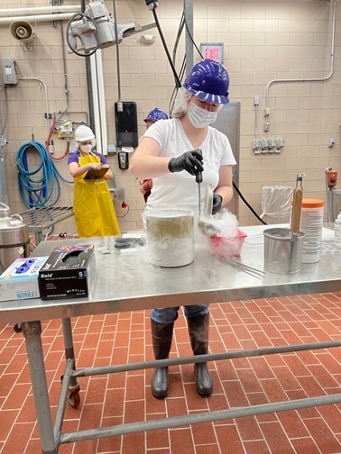Rimmer makes difference in swine production
Linnea Rimmer is a master’s student in animal science at Kansas State University who has been researching the muscle metabolism of pigs to improve production and feed efficiency through K-State’s Global Food Systems Initiative, or GFS, Seed Grant Program.
Rimmer is originally from Overland Park, Kansas and while she did not grow up living a production agriculture lifestyle, she did work at a family’s farmstead and rode horses, even competing all around the country doing so.

It was at that point Rimmer had a conversation with her undergraduate advisor, Cassie Jones, professor and teaching coordinator in the department of animal sciences and industry at K-State. Jones pointed her to an animal science undergraduate research class. Eventually, Jones asked Rimmer to be her teaching assistant. Rimmer accepted the position and remained in it until she completed her bachelor’s degree.
“I really can’t thank Dr. Jones enough,” Rimmer said. “She influenced me to go out of my comfort zone and do some spin-off projects and with that I was able to travel with her and present at a few conferences. She shared a lot of wisdom with me about what makes a good researcher and connected me to internships.”
Morgan Zumbaugh, assistant professor in the department of animal sciences and industry, is Rimmer’s master’s advisor and the lead principal investigator on the GFS project. Zumbaugh also played a significant role in helping Rimmer get to where she is today.
As her time as an undergraduate student was winding down, Rimmer wanted to go to graduate school but was unsure what to study. During the final semester of her senior year, she was taking an animal growth and development class taught by Zumbaugh.
“She invited me into her office and asked me if I had any jobs lined up or what I wanted to do after graduating,” Rimmer said. “I was pretty much stuck. Then, she asked me if I wanted to be her graduate student.”
Rimmer became Zumbaugh’s first master’s student and is now anticipating beginning her doctorate under Zumbaugh after she finishes her master’s in May.
 The goal of Rimmer’s research is to find ways to improve the growth and feed efficiency of pigs in a way that will be accepted by consumers. They ultimately hope to find a point in the life of a pig where they can intervene to improve the way it utilizes the nutrients it absorbs in order to save on costs for producers.
The goal of Rimmer’s research is to find ways to improve the growth and feed efficiency of pigs in a way that will be accepted by consumers. They ultimately hope to find a point in the life of a pig where they can intervene to improve the way it utilizes the nutrients it absorbs in order to save on costs for producers.
Rimmer was involved with almost every aspect of the project — creating protocols, preparing and optimizing the tests, harvesting muscles from pigs to study them and finally, gathering and analyzing the data.
“We have been able to pinpoint ages in the swine production timeline where we see distinct metabolic changes,” Rimmer said. “We could potentially intervene at these times and improve how the animals utilize those nutrients, positively impacting feed efficiency.”
Rimmer was recently recognized for her work as a College of Agriculture Graduate Student of the Month for October 2022.
Learn more about Rimmer and Zumbaugh’s research by clicking the link in Zumbaugh’s name under the FY 2022 drop down menu.